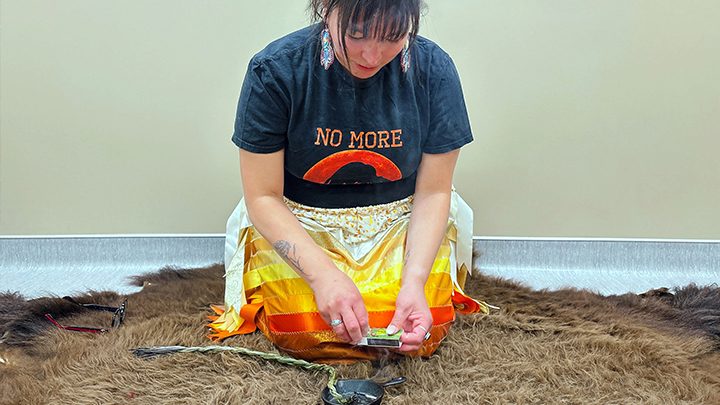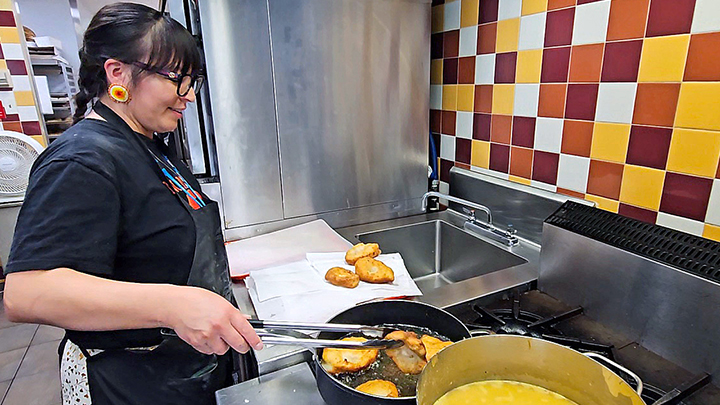
September 23, 2025

Jasmine Peltier, Indigenous wellness coordinator at Red Deer Regional Hospital Centre, provides traditional Indigenous wellness services like smudging to help patients and families feel more at home in the hospital during difficult moments. Supplied.

Here Peltier can be seen preparing bannock in the Cafe VA kitchen as part of the celebrations for last year’s National Indigenous Peoples’ Day. Photo by Heather Kipling.
Story by Jonathan Koch | Photo by Heather Kipling
RED DEER — Jasmine Peltier’s life journey has taken her from personal healing to a meaningful career in healthcare.
Now the Indigenous wellness coordinator at Red Deer Regional Hospital Centre (RDRHC), she’s leveraging her lived experience to become a force for change in Indigenous wellness.
An Anishinaabe woman from Wiikwemkoong Unceded Territory on Manitoulin Island, Ont., Peltier moved to Alberta at 19. After recovering from addiction, she began working as a health care aide in Innisfail. It was during this time that she experienced a moment of spiritual clarity.
“The universe works in mysterious ways,” says Peltier. “One day, I was walking my dog and came across a Naloxone kit, a $20 bill and a rock that said ‘Every Child Matters’ — all laid out in this pattern on the path. I thought that was really significant.”
Shortly afterward, she accepted a peer support role at Red Deer’s overdose prevention site, where she connected deeply with people in crisis. “I’ve been there. I’ve done that. I understand what that headspace is like — the struggle.”
Then, a chance encounter with RDRHC’s previous Indigenous wellness coordinator opened a new door. After shadowing the role, Peltier realized: “Maybe this is my niche. Maybe this is where I need to be.”
Today, in that role herself, she provides traditional Indigenous wellness services to patients and families, including smudging, spiritual support and advocacy. She also educates staff and works to make hospital spaces more welcoming.
“Our Indigenous medicines awaken our spirit, even in addiction. It sparks something inside us,” she says.
Although the position has existed for more than a decade, Peltier continues to raise awareness through signage, pamphlets and workshops. She also advocates for outpatient access and expanded cultural programming.
“It’s really about making Indigenous people feel safe and more at home when they’re in the hospital.”
In moments of uncertainty or mistrust, Peltier brings calm, according to Janel Boomer, unit manager of oncology and palliative care at RDRHC.
“Jasmine has brought immense comfort to the patients she supports on the unit — not only through her deep cultural sensitivity, but also through her unwavering advocacy,” says Boomer. “She listens attentively to patients and their families, then uses her voice to champion their needs and create meaningful change.”
Boomer adds staff have come to rely on Peltier for guidance with culturally significant practices, such as arranging timely smudges at end of life, and for helping families navigate the hospital system during incredibly difficult moments.
“Her role is a true gift to those in our care and to the team that supports them,” Boomer says.
Blaine Ironside, patient care manager at the hospital, says Peltier’s presence is deeply valued.
“When we don’t have someone like Jasmine in place, we really miss it,” he says. “Her role is very important to bridge the cultural gap.”
Ironside says her work has shifted his own understanding of Indigenous health and trauma. “It’s changed my perspective and how I think about the day-to-day impact of colonization on Indigenous patients,” he adds. Her work has touched many people.
One Indigenous ICU patient, estranged from her family, found comfort in her presence. Another patient, facing difficult palliative care decisions, found peace through her guidance toward hospice care.
“She was bubbly in her final days,” a family member wrote. “She was treated with respect and humility. Your help hasn’t gone unseen.”
Although her work can take an emotional toll, Jasmine Peltier remains committed to helping Indigenous patients navigate their journey through the healthcare system.
“There are days I hear really heart-wrenching stories. I try to smudge and pray, to let it go and send it up to the Creator, but I carry it home because I care,” Peltier says.
“As long as I can provide that support going forward — and have that encouragement and acknowledgment — that’s what keeps me going.”